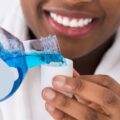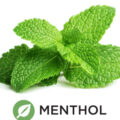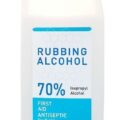You’ll know that you’ve gotten a mouthwash that contains alcohol when you gargle with it. It’s the one with that slight burning sensation, which always seems to tell your brain, “Ah, it’s working.” Many people associate the burning sensation of the alcohol as the act of cleaning the mouth. However, it is important to note that quality, active ingredients make the difference, not the amount of discomfort involved when you gargle.
Is Alcohol Mouthwash Bad?
It’s common knowledge that alcohol can kill bacteria (it’s commonly used as a disinfectant), so it makes sense that the alcohol in mouthwashes is added specifically to kill the bacteria that give you bad breath. Actually, the concentration used is too low to kill microorganisms. Even Crest, which sells mouthwashes, admits as much on its website! It all has to do with concentration. Beers are 3-8% alcohol; wines are 7-18%; while spirits are 30% or greater. The disinfecting alcohol you buy at the drugstore is 70-99% alcohol. By comparison, mouthwashes have concentrations of alcohol up to 25%, which fall short of an antiseptic effect.
Not only that, but alcohol can actually make bad breath worse! That’s because it dries your mouth, which may actually provide a cozier environment for the bacteria that foul your breath
Alcohol in mouthwash is used as a carrier agent for ingredients like menthol as well as a preservative, not to kill bacteria. Using mouthwash will mask bad odour but will not get rid of the bacteria producing it.
How to choose a mouthwash
There are two types of mouthwashes: cosmetic and therapeutic.
Cosmetic mouthwashes control bad breath temporarily and leave a pleasant taste in your mouth.
Therapeutic mouthwashes include ingredients that provide long-lasting bacterial reduction and can be used for conditions such as receding gums, gingivitis, dry mouth, and plaque buildup. They’re available over-the-counter and by prescription.
What do you want your mouthwash for?
When choosing a mouthwash, the first thing to consider is your personal oral health goals.
Bad breath. If your main concern is bad breath, using a cosmetic mouthwash on the go during the day may be sufficient for increasing your confidence during that important afternoon meeting.
Dry mouth. If you’re taking medications or have a condition that produces dry mouth as a side effect, using a mouthwash designed to provide oral comfort for many hours at a time may be your best bet.
Plaque or gum issues. Other conditions, such as plaque buildup, receding gums, and gingivitis can be addressed by choosing mouthwashes containing fluoride, or those with other active ingredients that fight bacteria.
Other considerations
Price per ounce. Cost may be another factor to consider. Take a look at price as well as the number of fluid ounces each bottle of mouthwash contains. Packaging can sometimes be deceiving. Buying larger bottles or in bulk can sometimes reduce the price per ounce, making the mouthwash cheaper in the long run.
ADA Seal of Acceptance. Check the mouthwash label for the ADA Seal of Acceptance. It means that it’s been tested for effectiveness. Not every mouthwash has it, including some with well-known names.
Look for these ingredients
It’s important to take a close look at the ingredient list. Many products have multiple ingredients geared to treat specific conditions or overall dental health. Some ingredients in mouthwash to look for include:
Fluoride. This ingredient fights tooth decay and strengthens enamel.
Cetylpyridinium chloride. This eliminates bad breath and kills bacteria.
Chlorhexidine. This reduces plaque and controls gingivitis.
Essential oils. Some mouthwashes contain compounds found in essential oils, such as menthol (peppermint), eucalyptus, and thymol (thyme), which have antifungal and antibacterial properties
Carbamide peroxide or hydrogen peroxide. This ingredient whitens teeth.
If you want a mouthwash that is effective at reducing your risk of cavities (now known as “caries”) and gingivitis (gum inflammation), you may want to look at a “therapeutic mouthwash” to complement your dental hygiene routine. These mouthwashes contain an active ingredient like cetylpyridinium chloride, menthol or fluoride. SEE:Pros And Cons Of Mouthwash With Alcohol






